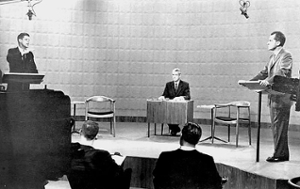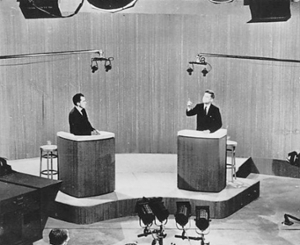
The Kennedy-Nixon Debates in Modern Politics
Do Modern Politicians Care About the Kennedy-Nixon Debates?
Compared to the Lincoln-Douglas debates, the Kennedy-Nixon debates have been left out of the limelight in modern American politics. As opposed to the challenges to Lincoln-Douglas-style debates and the expressed desire for a return to debates on that mythical level from political candidates, there are few if any public remarks from politicians referencing the Kennedy-Nixon debates. The primary themes that modern political commentators focus on when they do reference the debates, beyond the historical significance of the first formal face-to-face debates between presidential candidates and the novelty of its televised broadcast, are the perceived importance of style over substance in modern political campaigns and the search for a tidbit of drama in the debates to be turned into a news story.
The Views of Political Commentators
The persistent story of Nixon’s haggard appearance and lack of makeup costing him the first debate and ultimately the presidency is trotted out occasionally by political commentators during more recent debates.[1] Rich in 2004 compares the conditions that the Bush committee requested for the debates (which Minow claims were rejected unanimously by the Commission on Presidential Debates but which Rich argues were implemented anyway) with Nixon’s failures in the first presidential debate. The decision to center the first debate on foreign policy (which past and future Republicans would argue was the strong point of their party), leading to the juxtaposition of Bush’s arguments of success with a rising body count in Iraq, argues Rich, was just as damaging as Nixon’s decision to refuse a make-up artist before the 1960 debate. Rich also implicitly draws the comparison between Nixon’s pre-debate mastery of television and that of the Bush administration, comparing the success Nixon had had with the Checkers speech and as part of the expert Eisenhower TV advertising campaign with the Bush administration’s promotion of its supposed successes in the Iraq War. The failures of both men and their organizations during their debates may reflect the difficulties of the debate format, but given the differences in the nature of the mistakes (failed physical presentation of the candidate to the public as opposed to a misreading of public opinion and perceptions of the international situation) may reflect more on the individual circumstances that led them to fail in their presentation, rather than on the medium that they happened to occur in.
The first strain of reflection from modern political commentator, the importance of appearances over discussion of the issues, is frequently mentioned in connection with the 1960 debates. While commentators in 1960 hoped for a revitalization of democracy using modern technology as the result of the debates (embodied in the closing remarks of Quincy Howe, the fourth debate moderator), the actual result that many perceived even immediately after the debates was that the debates had consisted largely of canned remarks and repetition. Wicker, commenting on a bill requiring presidential candidates to participate in debates in order to receive federal funding, argued that ever since their inception the presidential debates had been based “more on the appearance and manner of the candidates than on any of their unremarkable remarks”.[2] He continues to argue that based on this, incentivizing debate through the lure of public financing is not beneficial to democracy. In this view, candidates should have the option to refuse debate and risk public ire, on the possibility that debating may benefit one’s opponent more than oneself (as he argues it benefited Kennedy more than Nixon). The focus on cosmetic aspects of the debates appears in other articles, including a look at the arrangement of the furniture of the debates and the effect it may or may not have had on the election.[3]
The second theme of political commentary on the first presidential debate series, the search for the news-generating excerpt, either actively searching for such excerpts in the moment or as meta-commentary on the process after the fact. The famous examples of Ford’s gaffe regarding Poland, Reagan’s comment on Mondale’s age, and Gore’s audible sighing both altered the public’s perception of the debates. The results of public polls, however, changed over the subsequent days as pundit coverage focused on these instances rather than the issues debated. Rich’s 2000 article explicitly brings up expectations that the 2000 debates between Bush and Gore would match up to a mythical standard set by the Kennedy-Nixon debates, selecting specific characteristics of both candidates that the news media had hoped would be on display during the debates to generate controversy and interest (although he did not mention Gore’s sighing, which would become the central element of media commentary on the event). The response of candidates and reporters alike to this phenomenon is explained by Rich: candidates avoid any responses that do not mirror their previous campaign statements, while the media scour these lifeless contests for anything that can be used for the news (unsuccessfully, according to Rich, in the case of the Bush-Gore debate).[4]
The contemporary memory of the Kennedy-Nixon debates focuses on the importance of appearance in the debates, centering on Nixon’s during the first debate, and on the novelty of the introduction of televised debates. As commentators stated at the time, the Kennedy-Nixon debates did not create a tradition of highly informative debate in American politics, but simply another venue for candidates to present themselves to the public as best they can and repeat clichéd campaign statements without making any embarrassing comments.

